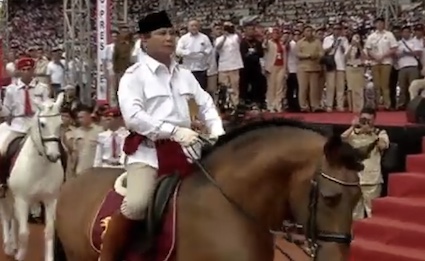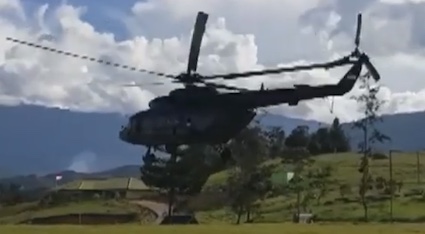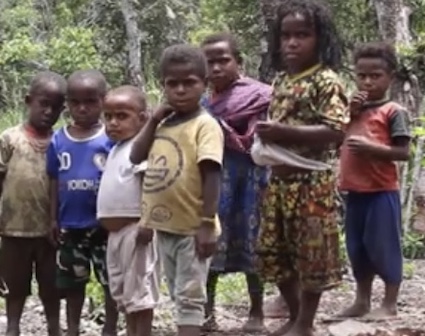Indonesia Election and Prabowo: West Papua and Reasons to Fear
Noriko Watanabe and Lee Jay Walker
Modern Tokyo Times

The election in Indonesia highlights political cronyism and promises to be even more dire for the indigenous West Papuans.
This concerns the presidential election victory of Prabowo Subianto and his history of human rights violations in East Timor (Timor-Leste) and other areas. Accordingly, the feeling of this election is that dynastic political elites are in ascendence with the fear of military pressure increasing in West Papua.
The Jacobin reports (Douglas Gerrard), “Foreign observers would likely read a Subianto triumph in 2024 as evidence of Indonesia backsliding on its hard-won democratic inheritance. But the failure of Indonesia — even democratic Indonesia — to obtain any level of subaltern consent for its rule in West Papua has already ensured its continued reliance on predemocratic methods: harassment, torture, military violence, and a brutal carceral regime. From Suharto to Sukarno to Widodo, little has changed on the ground.”
The above is a depressive assessment of West Papua. Hence, despite progress internally in Indonesia, the region of West Papua continues to be ruled under Javanese colonialism. Whereby the state apparatus continues to exploit the natural resources for the benefit of Indonesia and to the detriment of the indigenous.
Before being elected, Prabowo blamed foreign agitation for part of the problems in West Papua – rather than the brutal policies of altering the ethnic and religious demographics on the ground and ruling West Papua colonially.
He said, “The Papua problem is complex because a separatist movement is happening there. We have been following this separatist movement for quite a long time, we see that there is foreign interference.”
He continued, “So my plan is certainly to uphold the law, strengthening the apparatus there, and also accelerate economic development.”

The above sounds all too familiar. In other words, similar to China and its control over Buddhist Tibet and Muslim Xinjiang – to Pakistan and its control of resource-rich Balochistan (Baluchistan) – Indonesia will utilize the state apparatus to rule West Papua from Jakarta. Accordingly, the economic development of West Papua will entrench power concentration backed by the security forces, who will rubber stamp control over the indigenous.
Hence, the new leader of Indonesia promises to strengthen the security apparatus in West Papua and focus on exploiting the natural resources of this land.
Executive Director Usman Hamid (Amnesty International – Indonesia) said, “It is precisely views such as this that have caused violence and conflict there to never stop.”
He continued, “The latest Lemhanas [National Resilience Institute] study shows that economic growth has failed to reduce violence and conflict.”
Economic projects (exploiting the resources of West Papua) in Flores, Halmahera, Nagari Air Bangis, Rembang, Rempang, and Wadas led to increasing human rights violations. Hence, these economic projects confirmed the power concentration of Indonesia at the expense of West Papuans.
Warpo Sampari Wetipo (Central Chairperson – The West Papua National Committee) said the indigenous people should avoid the election.
He said, “The first reason is because Indonesia is the colonial ruler and the people of West Papuan are a colonized nation that has yet to determine its political future or has yet to obtain its political status under international law.”
Wetipo continued, “The elections do not reflect the real desires or aspirations of the Papuan people, rather they represent a tool of hegemonic manipulation to maintain colonial rule over the West Papuan homeland.”
Hence, elections merely cement the economic and political control over West Papua by the occupying power of Indonesia.
Wetipo pointedly said, “What is real and right before our eyes is the politics of usurping power in Papua to further strengthen the expansion of capital, the military, and migrants (non-Papuans) in the land of Papua.”
Voice of America reports, “In 1998, Prabowo was fired from the military after allegations he ordered the kidnapping of pro-democracy activists, over a dozen of whom are still missing. He has also been accused of human rights abuses in East Timor.”
Political cronyism and dynastic family rule is being entrenched in Indonesia.
The Guardian reported (before the election), “Prabowo is running alongside the eldest son of President Joko Widodo, Gibran Rakabuming Raka, after a controversial court ruling that changed the candidate eligibility criteria, and has capitalized on the popularity of the outgoing leader, whose promises he has pledged to continue.”
Accordingly, the son of the outgoing president is being groomed for future leadership.
The election in Indonesia for the indigenous of West Papua seems all too depressing. This concerns the strengthening of the security apparatus by Prabowo and economic projects that cement Indonesia’s control over the natural resources of this land.
The BBC said, “The appropriation of land for new settlements, forestry concessions, mining projects including oil, gas, copper, and gold and farming, as well as military presence has infringed upon indigenous rights to land, resources and culture.”

The Guardian says, “Indonesia has controlled West Papua since invading in 1963 and formalizing its annexation through the controversial, UN approved, ‘Act of Free Choice’. Security forces are accused of severe human rights violations during the occupation with an estimated 500,000 Papuans killed.”
Overall, the struggle for independence in West Papua will continue – along with the tyranny of the state apparatus of Indonesia.
East Timor finally broke free from Indonesia – it remains to be seen if West Papua will also break free from the yoke of Indonesian colonialism and oppression.
Paradise Bombed – Video documenting the hidden West Papua
https://www.ipwp.org The International Parliamentarians for West Papua (IPWP)
https://jacobin.com/2023/11/indonesia-west-papua-colonialism-development-repression-resistance

Modern Tokyo News is part of the Modern Tokyo Times group
http://moderntokyotimes.com Modern Tokyo Times – International News and Japan News
http://sawakoart.com – Sawako Utsumi and her website – Modern Tokyo Times artist
https://moderntokyonews.com Modern Tokyo News – Tokyo News and International News
PLEASE JOIN ON TWITTER
https://twitter.com/MTT_News Modern Tokyo Times
PLEASE JOIN ON FACEBOOK